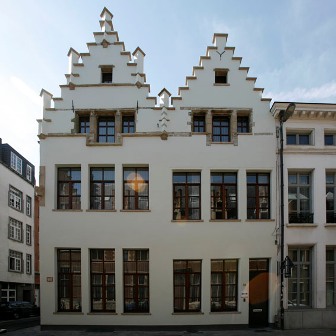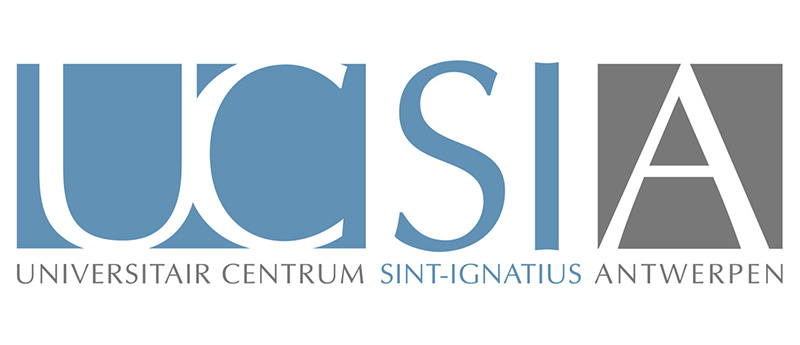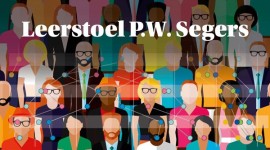P.W. Segers Chair
The P.W. Segers Chair is a joint venture between UCSIA and Herman Deleeck Centre for Social Policy at the University of Antwerp.
Events
An Existence without Basic Job?
lecture Chair P.W. Segers
(in Dutch)
12 May 2020
Are there still jobs for the low-skilled in Belgium?
webinar (in Dutch)
7 May 2021
The Value of Work
employment for the low-skilled
Chair P.W. Segers series (in Dutch)
27 October 2021
The Role of the Government
employment for the low-skilled
Chair P.W. Segers series (in Dutch)
15 November 2021
Corporate Social Responsibility
employment for the low-skilled
Chair P.W. Segers series (in Dutch)
22 November 2021
The Cost of Outsourcing
employment for the low-skilled
Chair P.W. Segers series (in Dutch)
29 November 2021
Migrants on the Job Market
employment for the low-skilled
Chair P.W. Segers series (in Dutch)
13 December 2021
Long-Term Sick Leave
lecture Chair P.W. Segers (in Dutch)
24 May 2022
The Social Struggle of Climate Policy
lezing Chair P.W. Segers (in Dutch)
16 May 2024
The Chair was previously held by:
Lecture Bea Cantillon - Inequality in Belgium (2017-2018)
Lecture Branko Milanović - Inequality in the Age of Globalization (2017-2018)
Due to their strong economic growth, densely populated Asian countries such as China or India have been able to keep up with the income growth of Europe and North America. Many people worldwide now earn the median world income. On their left they find a group of 10% of world citizens in absolute poverty; on their right, a small group of a few % super rich. By 2050, inequality between countries will decrease further, but inequality within poor and rich countries will increase. That has destabilizing social and political consequences.
The ‘elephant curve’ shows that the income of the lower middle class in the USA and the United Kingdom is stagnating. It feels surpassed by the working population in the up-and-coming Asia, which is getting richer, and fears that their jobs may disappear due to cheap export or outsourcing of production. According to some, this explains the populist voting behaviour for Brexit and Trump.
The guest speaker believes that traditional instruments for income redistribution, such as progressive taxes, social insurance and transfers, no longer work. He is an advocate of equal opportunities, also worldwide, and expects great investment in education and training or tax benefits for the poor rather than bonuses for wealthy shareholders. This is how poor people in poor countries obtain the keys to a higher income.
New migration waves suffer low ratings in public opinion in the North due to many reasons – and fears – yet Prof. Milanović advocates circular migration with an intermediary statute of citizenship. It protects the wages and working conditions of migrants on the basis of multilateral agreements, but by limiting the length of stay, imposing higher taxes or lower social benefits, it implies that the migrants do not have the same rights as the residents of the country where they work. The public and panel reflected on this view, and some had a hard time with the utilitarian nature of the proposal. In Belgium, 100,000 migrants work illegally in low-paid jobs and without social protection. In the Gulf countries, ‘openness to migration’ almost amounts to tolerating slavery. Governments, employers and employees accept increased migration under conditions such as the ILO Fair Recruitment Initiative.
The ILO Global Compact on Migration (2018) is based on the principle that social protection and labour rights must not differ between national and foreign employees.
CONTRIBUTORS: Luc Cortebeeck (International Labour Organisation), Mery Ferrando Gutierrez (UCL), Branko Milanović (City University of New York), Bogdan Vanden Berghe (11.11.11) and the rector, teachers, and doctoral students from the University of Antwerp: Bea Cantillon and Koen Decancq (CSB Herman Deleeck), Tom De Herdt (IOB), Guido Erreygers (Faculty of Applied Economics), Rosana Martinelli (IOB), Stefaan Marysse (emeritus IOB), Lorena Zardo Trindade (CSB Herman Deleeck), Herman Van Goethem (rector) and Sunčica Vujić (Faculty of Applied Economics).
Lecture series - A Universal Basic Income? (2016-2017)
An unconditional basic income for all is one of the proposals for greater income equality. Philippe Van Parijs and Toon Vandevelde described the historical and humanistic roots of the idea being propagated for decades by the Basic Income European Network (BIEN). Experiments show that the virtues of a universal basic income really become visible when citizens exhibit a different kind of ‘choice behaviour’ on the labour market. That is only the case when the experiment is sufficiently large and lasts a long time. Solid and convincing evidence is thus too scarce for governments to be able to decide to take that step of providing a basic income. According to Van Parijs, the introduction of a universal basic income is therefore mainly a utopian dream.
Many questions arise when one weighs the universal basic income with respect to existing policy instruments against poverty and for social protection. Those who see in a universal basic income leverage for more personal freedom of choice in shaping one’s life and career tend not to find it so relevant whether the basic income is higher or lower than the poverty threshold. Basic Income appropriated only as assistance for the poor ends up stigmatizing and necessitates administration, eliminating the argument of simplicity and accessibility.
The debate showed that the social partners – unions and employers – retain their confidence in the existing system of social security and protection that they want to reform, but not to give up. For them, the transition to an unconditional universal basic income for the sake of ‘idealistic’ motives represents an irresponsible leap into the unknown. The proponents of a Basic Income argue that the current system of social security has been supported already for a hundred years by the tax on the surplus value created by labour in companies. Today’s prosperity is increasingly achieved through technological innovation that is greater than a combination of labour and entrepreneurship. For them, a universal basic income is the new ‘social security 2.0’, financed by taxes on robots or consumption taxes on non-renewable energy resources, coupled with a redistribution of the decision-making rights.
Lecture series - Inequality of Income and Wealth (2015-2016)
The reading and discussion on Monday, March 21 submitted a variety of proposals for capital grants for further examination. Nicolas Barr explained how the British government – according to his recommendations – converted grants into loans and allowed the universities to determine their tuition fees by themselves. He gave concrete evidence of how this improved study opportunities for the weakest students. Ides Nicaise calculated that Europe could
lift 20 million people above the poverty line by providing a basic upper secondary education qualification to all unqualified adults. Paul Yperman
testified that all financial and other efforts by the government for a more accessible education only really show benefits where students, parents, school
administrators and government commit themselves personally and join forces.
On April 18, the question was voiced whether government, researchers, users, and social partners, among others, could direct technological developments so that innovation would keep more people at work and provide an income. Robert Went argued on the basis of the report ‘Mastering the Robot’ that this is indeed the case. Christa Sys and Jan Blomme closely monitor technological developments and new transshipment techniques in ports, and argue that the resultant productivity gains have allowed people to keep their jobs in the Flemish ports. Even here, however, the harmony between ‘people, profit, and planet’ is the fruit of concertation between all partners involved. The debate between different stakeholders and the audience showed that technological innovation involves demands and challenges that go far beyond the old ‘for’ or ‘against’ paradigm. In the long term, technological innovation increases well-being and keeps opening opportunities for social innovation, such as one and the same social status for all those working in the ‘share economy’.
CONTRIBUTORS: Nicolas Barr (London School of Economics), Jan Blomme (Flemish Port Commissioner), Bea Cantillon (University of Antwerp), Georges Delcroix (DDEL Portfolio Solutions), Gilbert De Swert (ACV), Stefaan Marysse (University of Antwerp), Ides Nicaise (HIVA/KU Leuven), Monique Ramioul (HIVA/KU Leuven), Christa Sys (C-Mat, University of Antwerp), Nico Tanghe (De Standaard), Frank Vandermarliere (Agoria), Antoon Vandevelde (KU Leuven), Robert Went (Scientific Council for Government Policy Netherlands), Paul Yperman (SJ Colleges).

UCSIA
Koningstraat 2
B-2000 Antwerpen
info@ucsia.be
Tel. +32 (0)3 265 49 60
Voorlopige locatie tijdens de renovatiewerken:
Blindestraat 14, 2000 Antwerpen





